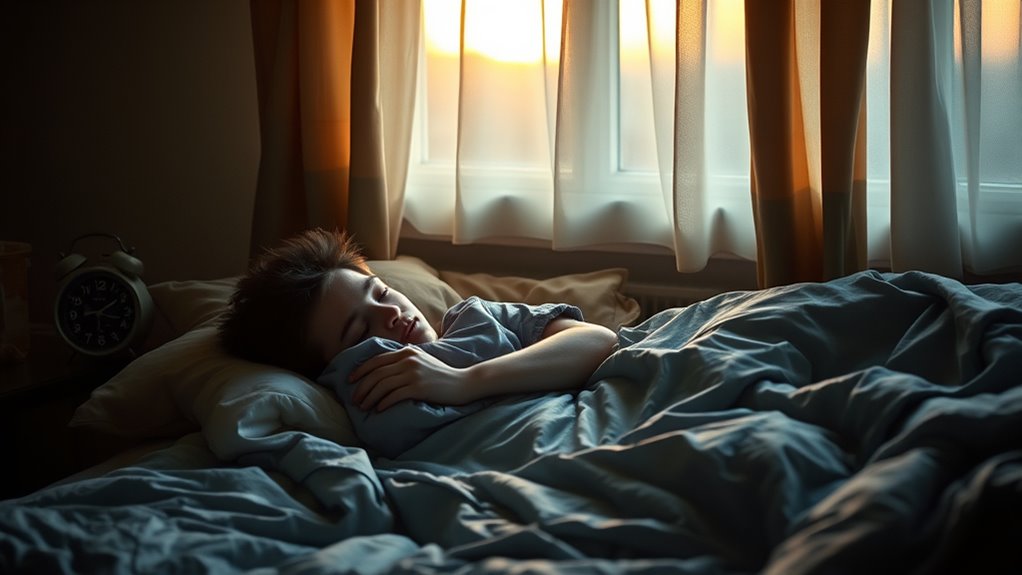You should support later school start times because teenagers’ biological clocks naturally delay during adolescence, causing them to feel more awake later at night and want to sleep in. Early schedules often cause sleep deprivation, affecting their mood, health, and academic performance. Aligning school hours with their sleep patterns helps boost alertness and well-being. If you want to understand how adjusting start times can benefit teens, there’s more to explore on how circadian rhythms influence their daily lives.
Key Takeaways
- Teenagers naturally experience a delayed circadian rhythm, making later school start times more aligned with their biological sleep needs.
- Early start times often cause sleep deprivation in teens, negatively affecting academic performance, mental health, and safety.
- Shifting school hours later can increase sleep duration, helping teens meet recommended 8-10 hours of sleep.
- Aligning schedules with sleep chronotypes reduces daytime sleepiness and improves alertness and mood.
- Recognizing biological sleep patterns supports healthier habits and decreases risky behaviors linked to sleep deprivation.

Your natural sleep patterns, known as sleep chronotypes, influence when you feel most alert or sleepy throughout the day. These chronotypes are closely tied to your circadian rhythms, the internal biological clock that governs your sleep-wake cycle. Circadian rhythms regulate various physiological processes, including hormone production, body temperature, and alertness levels, making them essential in understanding why you might be a night owl or a morning lark. For teenagers, these sleep patterns tend to shift during adolescence, leading to later bedtimes and wake times. This shift is a natural part of teenage development, but it can clash with early school start times, leaving many students chronically sleep-deprived. Recognizing the role of circadian regulation in sleep can help inform policies that better support adolescent health. Teenager sleep patterns are uniquely affected by biological changes during adolescence. As you hit your teens, your circadian rhythms tend to delay, meaning you naturally feel more awake later into the night and prefer sleeping in the morning. This biological shift is an evolutionary adaptation, but it doesn’t align well with traditional early school schedules. As a result, many teenagers struggle to get enough sleep, often sacrificing rest to meet early morning commitments. Sleep deprivation among teens can impair concentration, memory, and emotional regulation, which directly impacts academic performance and mental health. It’s clear that understanding these teenage sleep patterns is essential for addressing the mismatch between biological needs and societal expectations. Given this biological reality, the question arises: should school start times shift later? Research indicates that delaying school start times by even an hour can considerably improve sleep duration for teenagers. When schools begin later, students are more likely to get the recommended 8-10 hours of sleep, which benefits their overall health and academic success. It also aligns better with their circadian rhythms, allowing them to wake up feeling more refreshed and alert. Furthermore, later start times can reduce daytime sleepiness, improve mood, and decrease the likelihood of risky behaviors associated with sleep deprivation. Changing school schedules isn’t just about convenience; it’s about respecting the biological clock that governs teenage sleep patterns. Recognizing the influence of circadian rhythms on sleep can help schools create environments that support students’ health and learning. By shifting start times later, we acknowledge that teenagers’ biological needs differ from adults and younger children, leading to healthier, more alert students. Ultimately, aligning school hours with natural sleep patterns isn’t just a matter of comfort; it’s a necessary step toward fostering better academic outcomes and well-being for teenagers.
Frequently Asked Questions
How Do Sleep Chronotypes Develop Over a Person’s Lifetime?
You develop your sleep chronotype over your lifetime through chronotype adaptation, which is influenced by age, genetics, and lifestyle effects. As a child, you’re usually a morning type, but this can shift towards evening preferences during adolescence due to biological changes. In adulthood, your chronotype may become more consistent, though lifestyle factors like work schedules and social activities continue to shape your sleep patterns.
Can Sleep Chronotypes Change Naturally Without External Influence?
Ever wonder if your sleep chronotype shifts naturally over time? It’s a fascinating possibility, hinting at a natural evolution of your internal clock. While external factors influence this, your chronotype can subtly change without conscious effort. These shifts happen gradually, driven by biological rhythms and age. So, yes, your sleep preferences can evolve naturally, revealing the intriguing flexibility of your internal timing, even without external influences.
What Are the Genetic Factors Influencing Sleep Chronotypes?
You might wonder what genetic factors influence your sleep chronotype. Genetic markers, especially variations in circadian genes, play a key role in determining whether you’re naturally a morning or evening person. These genes regulate your internal clock, affecting sleep-wake patterns. While lifestyle can influence sleep, your genetic makeup sets a foundation for your chronotype, making some people predisposed to specific sleep preferences based on their circadian gene variations.
How Do Sleep Chronotypes Impact Academic Performance?
Your sleep chronotype affects your alertness and focus during the day, impacting your academic performance. When you’re aware of your chronotype, you can better plan your study and sleep schedules. Academic scheduling that aligns with your natural sleep patterns helps you stay energized and attentive, leading to improved grades. Recognizing chronotype awareness allows students and educators to optimize learning times, making education more effective and personalized.
Are There Differences in Sleep Chronotypes Across Different Cultures?
Like the shifting sands of ancient civilizations, cultural sleep norms shape societal sleep patterns worldwide. You’ll find that in some cultures, late nights and early mornings are embraced, reflecting values of social connection and activity. Others prioritize early rest, emphasizing discipline. These differences influence sleep chronotypes, making them vary across cultures. Recognizing this diversity helps us understand how societal expectations and traditions mold our natural sleep rhythms.
Conclusion
Imagine your sleep schedule as a garden, blooming at different times. Forcing everyone to wake up early is like forcing all plants to bloom at once—you miss out on their full potential. By shifting school start times later, you let each student’s natural rhythm flourish, just like plants thriving in their ideal sunlight. When we respect these chronotypes, we nurture healthier minds, happier students, and a more vibrant, balanced garden of learning.









